a tale of pursuit
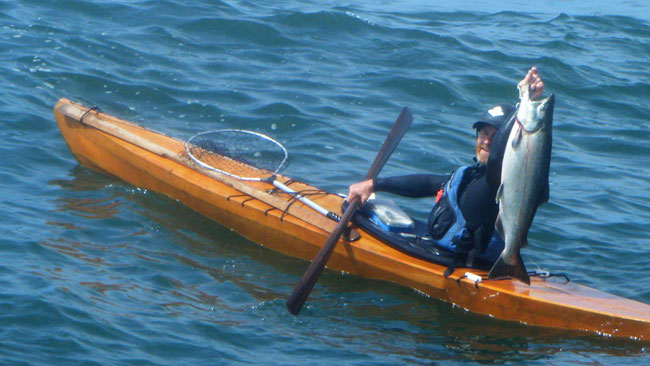
As the summer grinds to a close my favorite time of year draws nigh, that would be surfing-crabbing-salmon-mushroom-deer-elk-steelhead hunting season. Otherwise known as Autumn. Unfortunately, noone told the fish to wait patiently while I finished up the last classes of the year, and ever since I got wind of the bite a couple weeks ago my sleep schedule has suffered miserably. So far I've caught three summer chinook salmon, all around ten pounds, which is far from huge but certainly plenty of challenge , one of which caused some decidedly tiddly moments in the narrow greenland kayak I was paddling at the time. The bite is intermittent though and I've been putting in about 12 hours per fish. A few days earlier a couple friends of mine had hooked up just outside the Nehalem river bar on a certain tide and I was curious to see if lighting could strike twice. There was just one small problem, the surf was pounding, and our tiny little breakwater isn't exactly tranquil when the seas come up.
No problem I thought. That will keep the crowds down. I rather liked the idea of not having to contend with a small armada of motorboats.
Hoisting the old maid onto my shoulder I sighed at the dishonorable state of my kayak: broken deck lines, cracked ribs, missing backband, and a general malaise resulting from a life of mistreatment and months sitting in the rain. For as many nice boats as I send out every month, I never seem to find the time to make one for myself, surely a case of the cobblers kids going barefoot. I stuffed in float bags, tucking a random stick (to beat the fish with), a compass, a spare paddle, a few turns of tie wire, and a handful of wire-gate carabiners, a trout net, and a pole with a half-funtioning reel, under the remaining leather deck lines. Dropping the tailgate on my old V8 chevy I slid her in and clipped on a few bungee cords to keep the whole mess from flying out the back. Matthew was hanging out at the shop and I hate to see a talented kid wasting his life dry, so I invited him to grab a wetsuit and a surf kayak and ten minutes later we rattled down the road, one window permanently stuck open, one door permanently jammed shut, and about about 1/6th of a turn of play in the steering wheel from tie rods that I'd should take a look at but probably never will. I've driven worse.
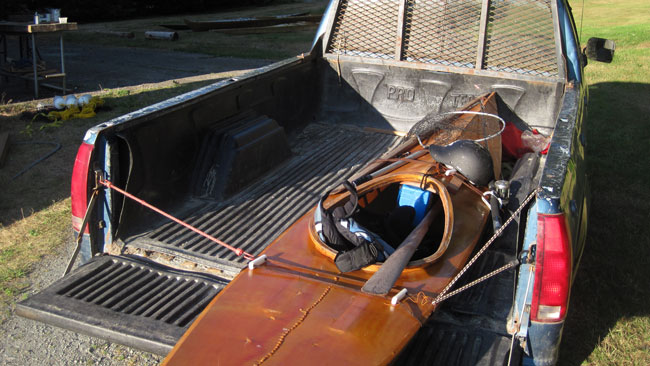
Nedonna beach is a quiet beach community directly south of where the Nehalem river dumps into the Pacific. There's an eerieness to the year round lack of habitation that I can't quite place, as though the the whole neighborhood comes alive at night with phantoms having barbeques and mowing their lawns, unaware that they'd somehow crossed over to the other side. Being just far enough away from stunning caves, cliffs, waterfalls, and secret beaches at the front of Neah-Kah-Nie mountain, Nedonna isn't the sort of place I usually spend a lot of time, but lately it's spooky charms have grown on me.
Matthew and I slithered into disgusting cold, slimy wetsuits before shouldering our kayaks for the 1/4 mile trudge, wandering across dunes and through a maze of giant bleached driftwood, on our way to the waters edge. I climbed into my kayak next to barnacles and starfish plastered to the giant black boulders that comprise the south jetty, and Matthew did the same in my tiny surf kayak, and for the twentieth time I reminded him of the strong current and his certain demise should he somehow be seperated from his boat. He'd live for an hour and a half in that stiff old 4mm billabong wetsuit, and he'd need about that much time to have any hope of swimming to shore. He rolled is eyes as usual and I was reminded of myself at 24.
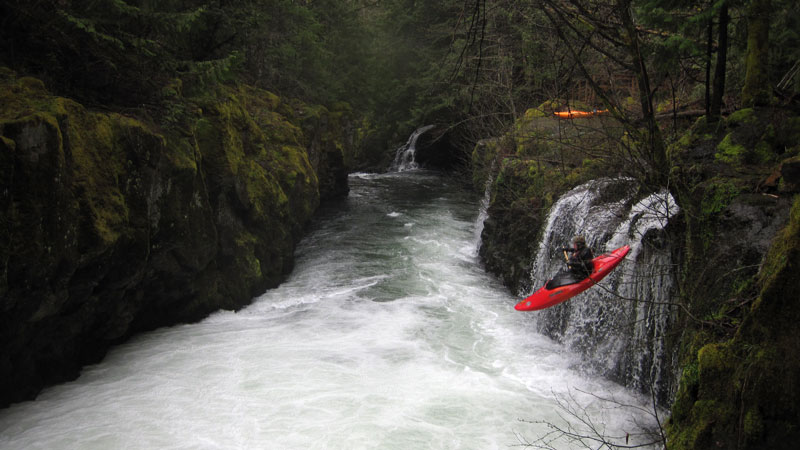
(a photo I took of Matthew this spring)
I snuck around the corner a breath away from the rocks, trading a dry head for the risk of getting mashed into hamburger, pulling in tight and stroking steadily upstream against an ebb current that spewed from the river mouth. Unfastening the fishing pole, I hooked on a herring, a weight, and let line to the bottom, letting it fan up until I felt like the bait was holding deep, but not too deep. There was a lot of wave action so I spun around and faced the ocean so I could take any breaking waves across the bow. Farther out things looked much worse. I was sitting in a pocket of water about 100 yards square and beyond that were lines of breaking surf detonating across the sandbars that fanned out from the river mouth in all directions. Things were fine here, but if I hooked into something bigger than 20 lbs, things could get interesting in a hurry.
Almost immediately my rod tip dipped and I felt the telltale nip, NIP, nip, nip, of a Chinook salmon mouthing the bait. These fish have an uncanny ability to molest one's herring without managing to get solidly hooked. With any other fish now would be the time to yank back for all you are worth, but with a Chinook, your only hope it to just let it nip and hope it manages to get a hook set somewhere that will hold. When the action stopped I reeled up to find my little fish bit at, but not looking all so bad, so I let it back down and once again I watched the rod tip dip and dip, and then nothing. I reeled up again to find the little fish in not such good shape this time, so I baited a new fish, and let out the line. This time there was no strike. Nothing at all.
With great worry I watched Matt blaze straight past me, leaving behind the shorebreak and using the current to deliver himself right into the fury of the outer sandbars. I kept him in the corner of my eye and his tentative behavior out there seemed to suggest that the scale of the waves up close had taken some of the piss out of him. Matthew is an amazing playboater and I've watched him fight a violent terminal hole in a river for 4 minutes so I knew he'd be OK by himself, still, he looked awfully small way out there.
Trolling back and forth just outside the jettys, I settled in for what defines most of fishing these days, waiting. I felt like I'd spooked the fish with those first few missed strikes and now they were wised up down there, laughing at my bait as it spun past again and again. That was fine, more fish would come, eventually one would make a mistake. In any other context I despise the torment of waiting, but fishing is different. It slows down the mind and opens the senses. It induces a mental stillness that almost forces one to interact with nature on it's own terms. You start to really SEE things when you sit in the same small area hour after hour. You notice the subtle differences in the waves with the tide, you watch the changes in the birds, baitfish, and sea lions. You see who wanders out on the jetty and what they do there for an entire half-hour. You rise and fall with the waves and the rhythm of the ocean insinuates itself into your equalibrium. You connect.
This is why I fish.
Fishing for salmon these days takes time. With only an estimated 6,000 chinook returning to the Nehalem river every year, and about a zillion people trying to catch them, the odds just aren't that great. One might wonder why we are allowed to fish for them at all, and it's a reasonable assumption that less fishing would increase the size of the runs, although one that isn't completely accurate. Predation, human or otherwise is just one of the challenges that face the dwindling pacific salmon runs. They also need spawning habitat and a good supply of food in the ocean. We know that the ocean food supply isn't what it once was, although it's difficult to quantify. Habitat on the other hand is pretty obvious. Salmon thrive in cool water in clean, non-sedimented streams with good structure (logs and rocks and whatnot). Indiscrimate logging practices (which still occurs on private land) has reduced the estimated spawning habitat to about a tenth of what it once was, and that may well be the limiting factor for the amount of fish we now have returning. It's a complex problem. This year anglers are allowed to keep 10 chinook, and 2 coho salmon, which is an absolutely upside down ratio considering that the coho outnumber the chinook 5 to 1. The difference reflects the difference in management between the feds and state agencies. NOAA fisheries, whom due to the threatened listing of coho salmon, has been aggressive in restricting the catch, Fish and Wildlife, who still controls the chinook is less so. I have no idea if the restrictions are too much or too little, like every other fishermen, I count on the agencies setting targets that will keep the stocks recovering. Our salmon are still at a tiny fraction of historic levels. Personally, I'm conflicted about the problem, as a rabid environmentalist I support an aggressive conservation philosophy, but I also believe that it's vital to allow some sort of recreational catch to the largest possible number of fishermen. Fishing allows people the opportunity interact with these fish in a direct visceral way, an opportunity to see what it is we are trying to protect.
Pondering this I weave back and forth in a slow endless cycle, reel up, check bait for seaweed, back down, back and forth...... I haven't seen Matthew in a while so I'm relieved when he climbs over the jetty and perches himself on the rocks, sporting his outrageous purple flowered hand-modified PFD, adorned with none other that a fabric painting of Abraham Lincoln launching off a waterfall in a whitewater playboat. Very few of my friends are normal. I pass by him and shout "...TWENTY MORE MINUTES...." before paddling back out the mouth for another pass. Having stripped the backband out of my own boat for a customer, my back is really hurting, and I'm more or less done playing fishing roulette with the occasional breaking wave that sweeps the mouth. I was right on one count though, there are NO other fishermen.
On my thousandth or so pass just outside the jetties, the rod dips again, NIP, nip, nip, NIP, NIP, I don't dare touch it, the only thing to do is hope the fish hooks itself, I slowly extract the rod from my PFD and start gently reeling when a powerful tug signals that I might have a solid hookup.
Then the line goes slack.
Not to be fooled I start reeling like mad because one of the Chinooks' best tactics for unhooking themselves is to make one fast run straight at the boat in hopes of slacking the line and getting leverage against the weight attached to the leader, then they shake, the hook dislodges and they're gone. I wound that crank like a sewing machine and barely brought tension on the fish as he flashed in the water right next to me and I caught a glimpse of what was by no means a small fish. As unhappy as you or I would be in the same situation, he took off with an attitude, peeling about 50 yds of line off of my reel in the process. The whole time we are moving out from the mouth and nearer the breakers and I'm getting an up close view of the situation I'm about to find myself in if I can't haul him back. I jam the pole back into my PFD, tighten the drag and start paddling hard for the mouth, slowly working the fish closer and closer to me by reeling intermittently with one hand. I pass by Matthew yelling, "I'VE GOT A FUCKING FISH!" so as to state the obvious, and he starts snapping photos and taking video clips of the ensuing tug of war. It's a bit harder to land a salmon in a kayak, for one because you have to paddle, two, because the the only net you can carry is small. Eventually anything you tug on long enough will tire out though and after about fifteen minutes while juggling the tenuous task of staying in postion, I managed to slip the nearly three foot long fish into my net, it's tail protruding, and roughly yanked the whole thing onto the dcck. I pinned down the net while it thrashed, beating it's brains in with the small stick I'd brought along. At least I'd remembered the stick this time, the last salmon had to be dispatched with a bottle of stout. Matthew took a very funny video of me hitting over the head seventeen times, which is admittedly excessive, but it was a big fish and I really didn't want it coming back to life on my deck. I ripped out the gills with my hands and bright arterial blood streamed down the sides of this beautiful animal. I clipped a carabiner through the mouth and then to a deck line, letting it bleed out into the water. This preserves the fish better and improves the flavor.
Looking at it's silver and spotted body, a body that had survived a year as a tiny fish is fresh water and then spent years traveling the Pacific, I felt stoic, thinking as I always do how life is such a miracle, and so fragile.
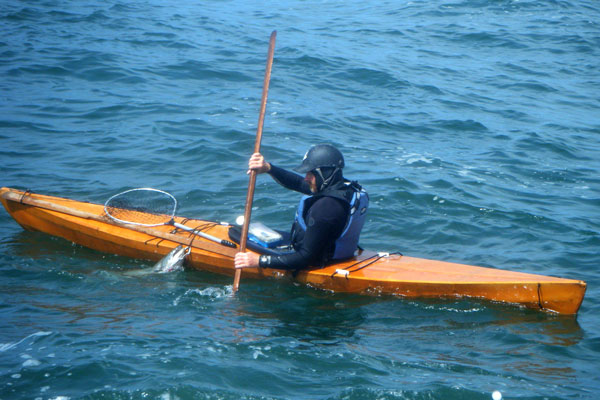
Checking my position, I quickly opened my sprayskirt, and stuffed the salmon down between my legs. I now had another obstacle to contend with. I paddled south of the jetty and straight into the breakers, putting as much distance between the rocks and me as I could before being sideswiped by the first big wave. I surfed it briefly before the whole thing walled up and folded over me, and instictually I fell into it as it engulfed my entire fourteen foot long high volume sea kayak in a churning ball of whitewater. Matthew took a fantastic video of me and my kayak dissapearing entirely for a slow count of five, but I still can't figure out video, so you'll just have to picture it. When wave finally finished it's job of force feeding salt water into my sinuses, I rolled up and paddled into shore, being careful not to lose the fish as I jumped out and onto the sand.
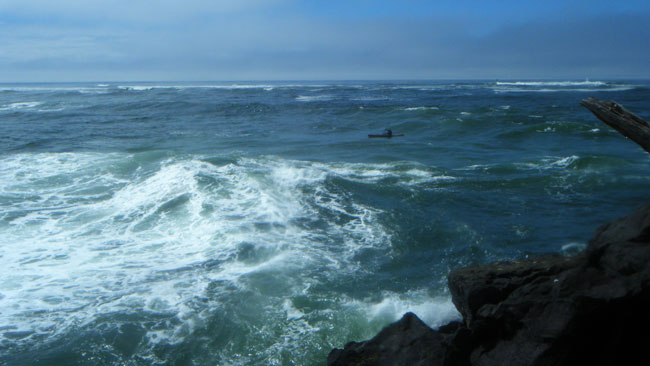
I pulled the boat up and brought the fish over to the rocks where I gutted it under the curious eyes of a few local kids, I showed them the heart, still beating, (they do that), which Matt took a video of as well. I put the boat on my head and plodded back to the truck.

At this point I was still convinced the fish weighed at least twenty pounds so you can imagine my shock when the scale at home weighed it at a mere fifteen. Still a mighty fish. I filleted off the sides with a razor sharp knife, taking great care not to miss any meat, slicing off little bits and eating them raw, encouraging others to do the same with varying degrees of success. That evening we lit a fire and cooked a big slice right on our home-made clay rocket stove. I let the cats chew on the carcass for a while before finally stuffing it in a bag and freezing it for crab bait.
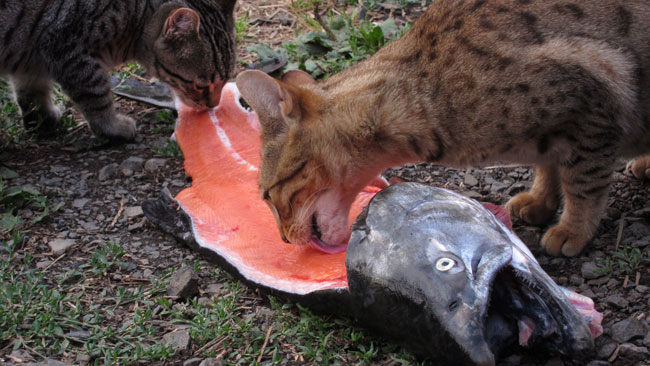
back to Cape Falcon Kayak